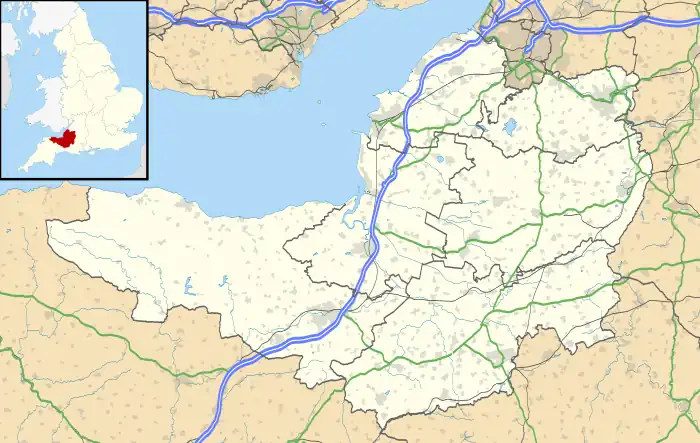
Duncorn Hill is an English, landmark, rounded hill with a flat top close to the Fosse Way. It is located on a limestone plateau south of Bath in Somerset and summits at 585 feet (178 m) above sea level.[1] The hill's name derives from Celtic din for fort and corn meaning horn shaped.[2]
Geology

The hill's bedrock is limestone of the Great Oolite Group[3] with deposits of fuller's earth[4] containing fossil shellfish.[5] This is typically covered with a free draining soil layer of 5–6 inches (13–15 cm), mostly brown or greyish brown but with some yellow patches.[6]
History
It has been speculated Duncorn Hill had been the site of a Bronze or Iron Age hill fort.[7][8] Field investigations were undertaken in 1966, but no evidence of a fort was found.[9] The scarps previously thought to be part of a man-made structure were shown to be natural geological formations. Investigators found no evidence of the cairns described in 18th century descriptions.[10] Nevertheless in 1975, Ralph Whitlock wrote of Iron Age, occupied, hilltop earthworks.[11]
References
- ↑ Appendix 8 Rural Landscapes of Bath and North East Somerset (PDF). 2003. Archived from the original (PDF) on 15 January 2011.
...and Duncorn Hill. These are important landmarks within the area.
{{cite book}}:|work=ignored (help) - ↑ Higgins, David (2006), The Bristol region in the sub-Roman and early Anglo-Saxon periods, Historical Association
- ↑ Fox-Strangways, Charles; Woodward, Horace Bolingbroke (1894). The Jurassic rocks of Britain. Vol. 4. Geological Survey of Great Britain. p. 97. Archived from the original on 5 February 2023. Retrieved 5 February 2023 – via Google Books.
- ↑ Memoirs of the Geological Survey of Great Britain and the Museum of Economic Geology in London. Geological Survey of Great Britain. 1876. pp. 126, 131.
- ↑ Mckerrow, William Stuart (February 1953). "Variation in the Terebratulacea of the Fuller's Earth Rock". Quarterly Journal of the Geological Society. 109 (1–4): 97–124. doi:10.1144/GSL.JGS.1953.109.01-04.06. S2CID 129156166.
- ↑ Low, A James (1938). "Bath, Somerset". Journal of the South Eastern Agricultural College (41): 189–195.
- ↑ "Monument NO. 204516". Pastscape. Historic England. Retrieved 12 February 2017.
- ↑ Woodward, Horace Bolingbroke; Rutley, Frank; Etheridge, Robert (1876). Geology of East Somerset and the Bristol coal-fields. pp. 126, 131, 261. Archived from the original on 5 February 2023. Retrieved 5 February 2023 – via Google Books.
- ↑ "Duncorn Hill". Fortified England. Archived from the original on 11 July 2011. Retrieved 16 January 2011.
- ↑ "Pastscape Monument No. 204516". English Heritage. Retrieved 24 January 2011.
- ↑ Whitlock, Ralph (1975). Somerset. Batsford. p. 55.
51°21′10″N 2°24′20″W / 51.3529°N 2.4056°W